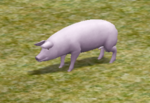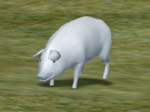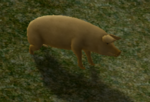Pig
Template:Languages Template:ItemInfo
Pig
A pig is a wild animal which was introduced in Tale 8.
There are different varieties of pigs, each with a different color.
A pig may be slaughtered using a wielded knife.(Per Malard, Flint Knifes are not sufficient to slaughter a pig.)
If successfully slaughtered, a pig can yield bacon, ham, or fat in different quantities depending on the variety.
A wild pig may be led by dropping dried wheat within 7 coordinates of it. Wheat that has been further processed into light, medium, dark, or burnt should also work.
Per Malard in Discord #general, slaughtering pigs will make other pigs within sight unhappy. However, mood coding is not complete as of Oct. 26th, so there is no penalty at present.
Pig Breeds
| Breed | Appearance | Bacon | Ham | Fat |
|---|---|---|---|---|
| Akorisinian |  |
2 | 2 | 0 |
| Athrinbyan |  |
4 | 2 | 0 |
| Ikenial |  |
0 | 6 | 1 |
| Koptish |  |
1 | 3 | 0 |
| Mendeshian |  |
2 | 2 | 2 |
| Naqadish |  |
? | ? | ? |
| Qusian |  |
4 | 1 | 0 |
| Settenuen |  |
9 | 3 | 0 |
| Windsnyer | 3 | 1 |
Change Log
07/11/2018 - added: bacon
09/15/2018 - Changed: All new pigs now have a breed, and each breed has a different color
09/19/2018 - Added: Pigs now yield bacon, ham, and fat depending on their breed
09/22/2018 - weird things with pigs should now be fixed
10/06/2018 - Swinery Demonstration given by Malard. Chat transcript here and edited version here
Ranching level 2 opened, players can convert empty cattle ranches (with at least one trough) into Pigsties, which become Swineries
10/07/2018 - Pigs can now be slaughtered in a Swinery
10/08/2018 - When adding Sour Milk to a Swinery trough, the empty jugs are returned
10/17/2018 - Swinery occupancy limit set at 15, additional pigs will need to be slaughtered before more piglets will be born. (A herd with 15 will go through one more breeding cycle, so more than 15 is quite possible.)
10/17/2018 - Pigs may now be removed from a Swinery by a player with a lasso
10/18/2018 - Pigs may be named
10/20/2018 - Fence damage now fully enabled
10/25/2018 - Rebalanced: pig breeding, it was getting a bit out of control (there is now a % chance that breeds will get pregnant) some are now quite low!
10/26/2018 - changed: the amount of milk soured at a time has been increased by approximately 25%
10/26/2018 - changed: food consumption in a swinery has been adjusted so that Pigs eat based on the multiplied ratio instead of the base ratio, i.e. if 1 spoiled food is worth 13 in the trough, when the pigs come to eat, they effectively consume 1/13th of the food
Domestic Pigs
A wild pig may led to a Swinery (requires Ranching Level 2) and attached to it with a Lasso. This section may eventually be expanded into a separate pages that cover more detailed aspects of domesticated pigs. (or maybe we'll just do it here for now)
Pig Feeding
A swinery's trough can be filled with a mix of three different substances: spoiled food, wheat, and sour milk. Each deben of an ingredient contributes a different amount to the food mix ratio: spoiled food contributes 13 "units" of food, wheat adds 5 units, and sour milk counts for 7 units.
Every three (real-life) hours, pigs will check the trough for food to see if the ratio of ingredients is within their preferred range. If so, there is a 50% chance they will consume a random ingredient; then a 50% chance they will consume a second, different ingredient; then a 50% chance they will consume the third, remaining ingredient.
Pigs eat in a predetermined sequence according to breed. Breed A will always feed before Breed B, and Breed B will always feed before Breed C. Knowing which breeds eat first may be helpful in creating a chain of events that allow breeds with different ratios to eat from the same trough. For example, Breed B prefers a 23-30% mix of wheat. Breed A prefers 28-40% wheat. Now, if your trough contains 32% wheat, Breed B won't touch it. However, Breed A may consume enough wheat to lower the ratio to 30%, at which point Breed B will dive in.
Pigs that do not have access to their preferred ratio of food will be labeled "hungry", then "starving". Hungry pigs will attempt to break out of the swinery, progressively damaging the fence until it is destroyed, allowing the pigs to escape. Pigs that escape will raid any nearby containers for food, including aging racks for cheese, warehouses, barrels, chests, etc. before disappearing.
A pig will not die as long as it has water available, but it will escape if its fence is not repaired.
Per Malard's comments in E-Lounge: "Each breed eats in sequence, I am not saying what that sequence is. Breeds can have overlapping requirements, so for example one breed might eat between 20 and 80, another might be 10 to 90 thereby giving the appearance that both breeds eat fine, but actually only the first breed eats pushing the second breeds tolerance out of whack."
On Friday, Oct. 26th, Malard's stated in Discord #general:
"pigs consume food every 3 hours
they do so in a set sequence
Breed 1 then Breed 2 then Breed 3 etc
breed 1 goes first, looks at the ratios in the trough and decides if they are acceptable then it will eat
it then decides 50/50 if it wants to eat sour milk, then it decides 50/50 if it wants to eat wheat etc
of the food types its decided on eating
it then consumes between 1-3 times the number of that breed of pigs in the pen of that food type
now here is the issue i found
a spoiled food for example should be worth up to 13 'feeds' rather than 1"
Successful Food Ratios
Note that due to rounding, pigs may appear to feed slightly outside their preferred ratio.
| Breed | Good % Spoiled Food |
Good % Wheat |
Good % Sour Milk |
|---|---|---|---|
| Akorisinian | 30-54 | 23-45 | 11-40 |
| Athrinbyan | 40-45 | 22-26 | 31-35 |
| Ikenial | 30-48 | 43-57 | 0*-19 |
| Koptish | 3-31 | 34-61 | 23-37 |
| Mendeshian | 19-26 | 60-74 | 5-16 |
| Naqadish | ? | ? | ? |
| Qusian | 10-48 | 26-67 | 12-36 |
| Settenuen | 30-38 | 31-34 | 29-35 |
| Windsnyer | 13-78 | 10-38 | 11-66 |
Useful Combinations
| Breeds | Spoiled Food % | Wheat % | Sour Milk % | Notes |
|---|---|---|---|---|
| Koptish + Settenuen | 28-31 | 31-45 | 30-36 | Minimal adjustments needed; with a large quantity of food, pigs won't need maintenance for many days |
| Settenuen + Windsnyer | 28-35 | 32-35 | 30-36 | |
| Settenuen + Akorinsian | 30-35 | 31-32 | 30-36 | Wheat is the key ingredient here, it may require regular adjustments to get the right balance for both breeds |
Feeding Sequence
Please adjust the order below when you discover a feeding sequence. For example, if you learn that Mendeshians eat before Athribyans, add them to the list in the proper order.
- Koptish
- Mendeshian
Unsuccessful Food Ratios
| Breed | Bad % Spoiled Food |
Bad % Wheat |
Bad % Sour Milk |
|---|---|---|---|
| Akorisinian | 76 | 14 | 9 |
| Akorisinian | 65 | 31 | 3 |
| Akorisinian | 51 | 27 | 21 |
| Breed | Bad % Spoiled Food |
Bad % Wheat |
Bad % Sour Milk |
|---|---|---|---|
| Athrinbyan | 56 | 20 | 23 |
| Athrinbyan | 29 | 33 | 37 |
| Athrinbyan | 33 | 29 | 37 |
| Athrinbyan | 45 | 16 | 37 |
| Athrinbyan | 45 | 26 | 27 |
| Breed | Bad % Spoiled Food |
Bad % Wheat |
Bad % Sour Milk |
|---|---|---|---|
| Ikenial | 39 | 27 | 33 |
| Ikenial | 76 | 14 | 9 |
| Ikenial | 50 | 22 | 25 |
| Breed | Bad % Spoiled Food |
Bad % Wheat |
Bad % Sour Milk |
|---|---|---|---|
| Koptish | 41 | 34 | 23 |
| Breed | Bad % Spoiled Food |
Bad % Wheat |
Bad % Sour Milk |
|---|---|---|---|
| Mendeshian | 33 | 42 | 24 |
| Mendeshian | 35 | 37 | 26 |
| Mendeshian | 39 | 27 | 33 |
| Mendeshian | 42 | 25 | 31 |
| Mendeshian | 48 | 51 | 0 |
| Mendeshian | 79 | 10 | 9 |
| Mendeshian | 74 | 10 | 15 |
| Mendeshian | 71 | 9 | 19 |
| Mendeshian | 76 | 14 | 9 |
| Mendeshian | 22 | 72 | 4 |
| Breed | Bad % Spoiled Food |
Bad % Wheat |
Bad % Sour Milk |
|---|---|---|---|
| Naqadish | 28% | 10% | 60% |
| Naqadish | 23% | 26% | 50% |
| Naqadish | 19% | 37% | 42% |
| Naqadish | 21% | 41% | 36% |
| Naqadish | 44 | 35 | 20 |
| Naqadish | 33 | 33 | 33 |
| Naqadish | 27 | 27 | 45 |
| Breed | Bad % Spoiled Food |
Bad % Wheat |
Bad % Sour Milk |
|---|---|---|---|
| Qusian | 76 | 14 | 9 |
| Qusian | 3 | 72 | 23 |
| Breed | Bad % Spoiled Food |
Bad % Wheat |
Bad % Sour Milk |
|---|---|---|---|
| Settenuen | 82 | 7 | 10 |
| Settenuen | 25 | 50 | 24 |
| Settenuen | 16 | 41 | 42 |
| Settenuen | 76 | 14 | 9 |
| Settenuen | 28 | 34 and 35 | 36 |
| Settenuen | 29 | 34 | 35 |
| Settenuen | 23 | 36 | 39 |
| Settenuen | 26 | 32 | 41 |
| Settenuen | 38 | 25 | 35 |
| Breed | Bad % Spoiled Food |
Bad % Wheat |
Bad % Sour Milk |
|---|---|---|---|
| Windsnyer | 75 | 14 | 10 |
| Windsnyer | 76 | 14 | 9 |
| Breed | Bad % Spoiled Food |
Bad % Wheat |
Bad % Sour Milk |
|---|---|---|---|
| Unknown |
Pig Breeding
If both the boar and sow are properly fed, they may breed. All breeds can be found in the wild, but some are extremely rare. Acquiring rare breeds through crossbreeding is more predictable than finding a wild one. Some breeds will reproduce much less frequently than others.
The limit of a swinery is 15 pigs. At this point, they may go through one more breeding cycle, but no more pigs can be moved into the swinery.
| Sow Breed | Boar Breed | # Piglets | Piglet Breed |
|---|---|---|---|
Pissed Pigs
A pig which is not properly fed will damage the fence of its Swinery, and eventually escape. An escaped pig will raid nearby storage units—including chests, warehouses, and aging racks—for anything edible. If we can cook with it, the pig may eat it. A hungry pig will not despawn until it is happy, and an escaped pig can be slaughtered by anyone.
15 Mendeshians caused fence damage requiring 5 wood to repair.
9 Settenuens caused fence damage requiring 10 wood, 1 board to repair.
The first time a pig does not eat, it is marked as "Hungry". A Hungry pig that tries to eat will cause some fence damage.
Walking Your Pig
A pig that likes you will follow you like a cat, until they are pissed off because they are hungry. Arbitrarily killing your pigs is not a good way to make friends with the survivors.
Mushroom Spawns
Pigs can find wild mushrooms when you take them out for a walk. The rarer the pig type the rarer the mushrooms they will likely find. Mushrooms should spawn outside of their usual time, but it will generally follow the rules of ecology.
Soft Clay Patches
Oddly, pigs are pretty good at finding hidden veins of Soft Clay patches that are not visible from the ground, as Scientists have been unable to devise suitable stable mechanisms for building on Clay. Soft Clay patches are needed to find suitable locations for building Raeli ovens. Rarer pigs will find patches other pigs cannot find. They prospect for patches that are suitable for building an oven on. So its a good way to basically work out what a patch of ground can spawn.
Comments
All reports of piglets have been same breed as the parent sow. There's no reason to believe that cross-breeding is implemented or working yet or, given that they're not eating yet and they're supposed to be fed/happy to breed, that the sows weren't already pregnant at time of capture. I wouldn't trust any breeding or food requirement data until they're eating and other things pigs are supposed to do are working. - Ashen (11 Oct 2018)
I have had piglets from that are the breed of the boar. Eugenius(18 Oct 2018)
Slaughtering does not seem to be an effective means of birth control yet. (Not sure if emotions are "working") 6 boars killed Peret IV-23, Leaving 1 boar, 2 sows. On next check of the swinery on Peret IV-25, there were 7 piglets.
Slaughtering a pig in a pen gives the same output, regardless of whether it is a sow or a boar.
When feeding, if the initial ratio % is within their accepted range, a herd of pigs can eat the remaining % of an ingredient in their trough, leaving it at 0%. The pigs may be labelled as "Hungry" even though they did feed. I am assuming that there was an insufficient quantity of the desired ingredient, so they ate what was left. (Peacefulness 25 Oct 2018)
Regardless of whether it eats, a pig seems to drink 2 units of water each time it checks the trough for its preferred foods. (This is incorrect. Water is consumed approximately once per hour (2 per pig) and the food cycle happens every (3rd? 4th? please confirm) water cycle. -Idris)
The food cycle occurs every three server hours, which should be every 9 hours on the in-game clock. (Peacefulness 28 Oct 2018)
- Ikenials have fed at a trough where the truncated sour milk value is 0. They have consumed sour milk in the past, so it is assumed that there is still some in the trough, but they are not labelled as "hungry" because milk was not chosen at their most recent feeding. (Peacefulness, 24 Oct 2018)
Unless you're trying to crossbreed pigs for rare breeds, allowing pigs to breed may be a bad thing. Consider that:
- Piglets eat as much as adults
- Hungry piglets damage fences as quickly as adults
- Piglets cannot be moved
- Killing the excess pigs will anger other pigs
They're a big liability, and with limited use for the meat products, there don't seem to be any positives outside crossbreeding. Spatulus (talk) 11:04, 26 October 2018 (UTC)